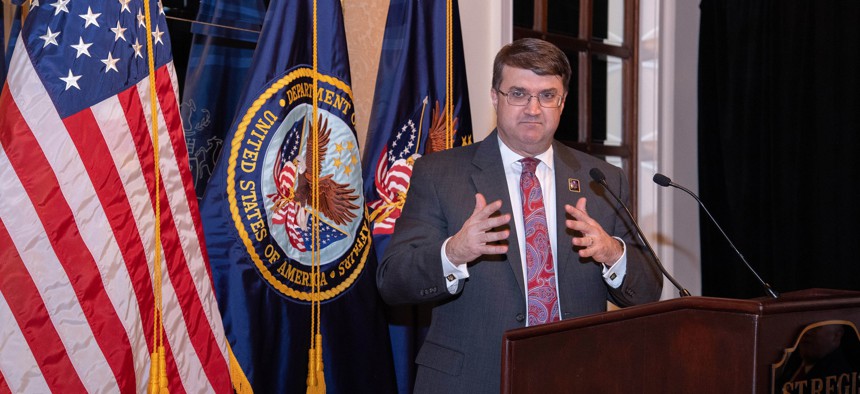
Veterans Affairs Department
VA Secretary: We’re Preparing for Coronavirus ‘Boomerang’ in Fall
In an interview, Robert Wilkie details efforts to stockpile equipment and boost hiring.
The Veterans Affairs Department is planning for a potential wave of COVID-19 cases and other illnesses starting this fall, which could force it to play a bigger role in the national public health system.
“We are preparing in the event this boomerangs on the country in the fall and in the winter,” said VA Secretary Robert Wilkie in an interview with Government Executive. “We are preparing for the eventuality of flu and COVID coming together.”
As a result, the VA’s “fourth mission” (in addition to providing health care for veterans, running the veterans’ benefits program and managing national cemeteries) of supplementing the national health care system in times of emergency could become even more critical in the coming months.
“What we’ve been able to do is stockpile for what may come, and I think we’re in an excellent place,” Wilkie said. “We have months of supplies on hand.”
The department, which has significantly boosted hiring since the pandemic began, also has accelerated efforts to add even more personnel. “We’ve thrown out the old playbook on hiring,” said Wilkie. “We’ve hired just in the last seven or eight weeks over 30,000 Americans.”
The agency has streamlined its hiring process to bring on employees much more quickly. “That’s one thing I don’t want to go back to—a process where in many cases it took a year to onboard someone who wanted to work for the federal government,” Wilkie said. “We’ve cut that down to seven to 10 days, and we’re seeing thousands of Americans flock to us.”
“We’ve been able to do some common-sense things that I think in the end will benefit the entire federal government.”
In the early days of the pandemic, VA employees voiced concerns about inadequate supplies of personal protective equipment. Wilkie disputed the notion that employees were at risk.
“Not one person who was on the front lines, in a COVID ward, or an emergency ward, or any of our hospital wards, ever had a shortage of equipment,” he said. “In fact, not one of our hospitals ever got below two weeks of supply. Now, what we did was to say that those people who work in our health care system who had no contact with patients—they were not going to get two or three changes of equipment. And I think that upset some people.”
In April, Government Executive reported that some VA facilities had instituted policies under which employees who worked with COVID-19 positive patients before their status was known should continue to work until they developed symptoms, after which they could be tested for the virus.
“We test employees who need to be tested,” Wilkie said. “We’re not going to give everyone a test just to give a person a test. In our nursing homes we do test all of our employees, we test all of our patients.” He said the department had conducted “hundreds of thousands of tests” of employees and veterans.
NEXT STORY: What's Really Going On At the Postal Service







